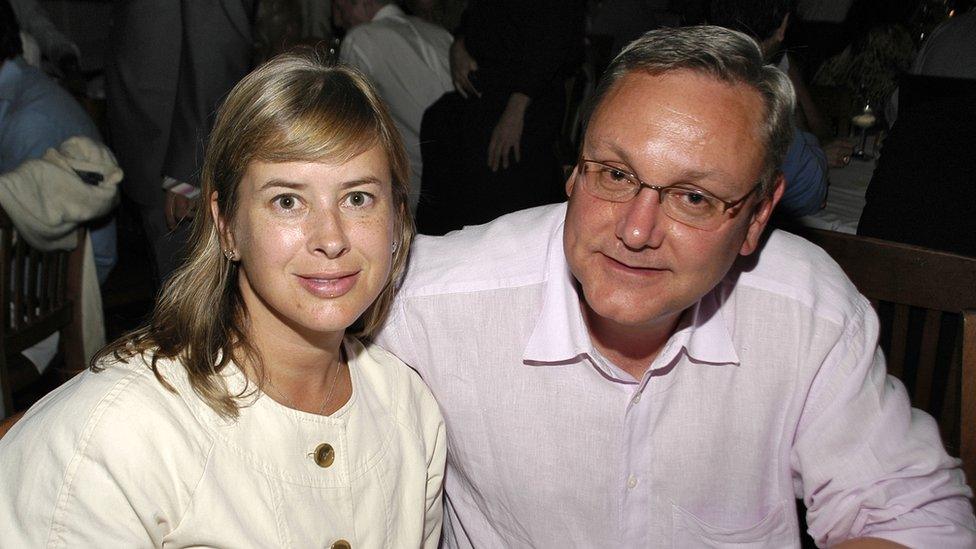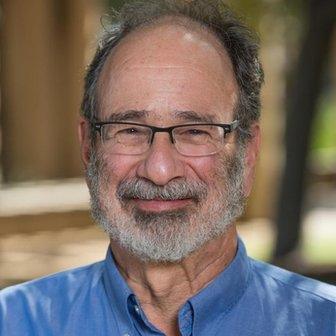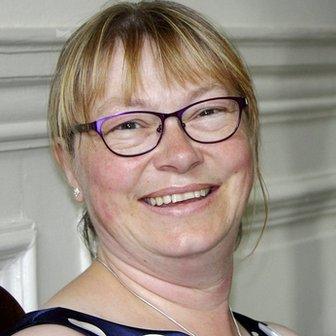Valentine's Day: This man devised a formula for finding love, and followed it
- Published

Ed Conard came up with "sequential selection" as a way of finding a partner
What's the best way to find the husband or wife of your dreams?
Think what society tells us about finding the perfect life partner: it's all about love; follow your instincts; it's down to fate.
Now consider what would happen if you followed similar advice in your job, or even trying to run a company.
Imagine telling investors you hadn't done any market research, had no long-term plan and hadn't bothered to study business. It wouldn't inspire confidence, would it?
Yet the choice of who to marry is without question the biggest decision you are ever going to take.
This is someone you're going to see virtually every day for the rest of your life; if you have kids, you'll almost certainly have them with this person; you'll share a bed, holidays, money, a home - pretty much everything, in fact.
Wouldn't it make sense to take a more rational approach?
The statistics certainly suggest lots of us are getting it wrong: 42% of marriages in England and Wales are thought to end in divorce. In the US, the estimated figure is even higher: about half all married couples divorce.
That's why Ed Conard decided he needed to "optimise" his search for a spouse when he wanted to get married 20 years ago.
Mr Conard is an uber-capitalist. He made millions running the venture capital company, Bain Capital, with former US presidential candidate Mitt Romney.
He is now an economic commentator and the author of the magnificently bombastic bestseller, Unintended Consequences: Why Everything You've Been Told About the Economy Is Wrong.
He calls the process he chose "sequential selection, no turning back" - romantic, eh?
Here's how it works.
Step one: Calibration
You start off by "calibrating" your choice. That means meeting as many suitable partners as possible.

Proof that the formula works? Keep reading...
Cast your net wide, he urges, but initially you must forget about lust and even love: "that's evolution trying to get us to have babies," cautions Mr Conard.
You won't date anyone now, you are just gathering people who might make the grade. There probably won't be that many, maybe a handful or two.
Once you've got a set of promising candidates, you move to phase two. You're going to date a third of this subset, choosing them pretty much at random.
You won't marry any of these people, according to his rules, so be prepared to be hard-hearted, moving on however attractive a potential partner seems.
The most suitable person in this period "calibrates" your choice, setting the standard for the next stage in the process.
Step two: Evaluation
What follows is what Mr Conard calls the "evaluation" period: this is when you actually choose your future spouse.
Once again, you've got to drop potential partners like a stone if you can't resolve problems fairly easily.
"You have to be ruthless," he insists. "If you are not highly confident that that person is a person you can be successfully married to… you have to get rid of them."
Here's Mr Conard's key rule: "When you find someone better than the best person in the calibration period, you marry them. And if you haven't found anyone by the end, you marry the last person."
Follow this process, he claims, and the statistics suggest they'll be as good a match as you're going to get.
Job done.
Better matches, happier marriages?
Mr Conard's approach to choosing a wife is a well-established method for buying things like a new place to live but, says Nobel Prize winning economist Alvin Roth, spouses aren't like houses: marriage is a market without prices.

You can do too much calibrating and evaluating, cautions Prof Alvin Roth
Prof Roth of Stanford University won his Nobel for his work on balancing the supply and demand of all sorts of resources that don't carry a price tag - schools and students, kidneys and patients, doctors and hospitals.
He agrees that it is important to meet quite a few possible partners before you take the plunge - "don't marry the first person you meet", he warns.
You've also got to have realistic expectations: "The first thing a matrimonial agency has to do is persuade clients they aren't a 10."
But, he says, you can do too much calibrating and evaluating. Choosing a partner is a two-way thing: it is only when you are serious about marriage that potential partners will take you seriously.
"Part of being well matched is the history you share and this starts when you first meet," Prof Roth says, "so investing in that history improves the quality of that match."
To use an economic metaphor, you have to build up some capital.
What about love?
That's no doubt what lots of you will be asking.
"It sounds a little bit cold, a little bit calculating, very unromantic," says Nicola Cornick, a bestselling author of dozens of romantic novels and the chair of the Romantic Novelists' Association.

"Under an instant attraction, there are probably rational criteria there as well," says Nicola Cornick
Not surprisingly, she is a big fan of love and romance in relationships.
"If working your way through a checklist with a whole load of people works for you, then hey, that's great," she laughs.
"What I would counsel against is throwing out the element of spontaneity."
Mrs Cornick believes the idea that being swept off your feet is always irrational is just plain wrong.
"I think if you examine what lies under an instant attraction, there are probably rational criteria there as well," she says. "You've got the same sense of humour, you've got shared values or interests."
And she's not alone in thinking that. Let's cut to the chase…
How did the real story end?
Did Ed Conard meet his perfect match?
Jill Davis is the woman he finally fell for - or should that be "selected"?

"I just went with my gut," says Ed's wife Jill Davis. The couple, pictured here recently, and pictured above in 2007
She acknowledges his systematised approach is probably "unique" and - you may be surprised to discover - she was "charmed" that he had put so much thought into the process.
But there was no methodical reasoning for her when she met Mr Conard on a blind date. "I just went with my gut," she admits. "I thought Ed was a brilliant person. I'd not met anyone like him before."
And think about it this way. Jill had ranked top in Ed's brutal search process so she was, judged by his objective criteria, the woman of his dreams.
But what about romance, I want to know. "For him, this is romantic," she says, "but a different version of romance."
Jill and Ed have been happily married for 18 years, so maybe their romance is evidence the head and the heart can work together.
Now there's a thought for Valentine's Day!